Hiccups can be annoying and sometimes hard to get rid of. But you don’t have to deal with them alone. In this guide, I’ll share many effective ways to stop hiccups fast. You’ll learn simple home remedies and over-the-counter options to help you.
Key Takeaways
- Discover effective home remedies to stop hiccups quickly
- Learn about the common causes and triggers of hiccups
- Explore natural cures and over-the-counter medications for hiccup relief
- Understand preventive measures to reduce the likelihood of recurrent hiccups
- Manage stress and anxiety to address the mind-body connection behind hiccups
Understanding Hiccups: What Causes Them?
Hiccups are a common and often puzzling event that we’ve all had at some point. They are sudden, involuntary contractions of the diaphragm muscle, along with the quick closure of the vocal cords. Let’s look into what causes these hiccups and the common triggers and risk factors.
Exploring the Mechanisms Behind Hiccups
Hiccups happen when a reflex arc is triggered. This involves the diaphragm, the vagus nerve, and the phrenic nerve. The diaphragm suddenly contracts, taking in air sharply. Then, the vocal cords close, cutting off the air.
This sequence is set off by various stimuli. These can disrupt the nerves and muscles involved.
Common Triggers and Risk Factors
- Overeating or eating too quickly
- Drinking very hot or very cold beverages suddenly
- Some medications, like sedatives, muscle relaxants, and opioid painkillers
- Respiratory infections or irritations, such as the common cold or acid reflux
- Feeling stressed or anxious
- Certain medical conditions, like liver diseases or some cancers
Knowing how hiccups work and what can trigger them is key to finding ways to get rid of hiccups, hiccup remedies, and stop hiccups. Using home remedies for hiccups can help.

Tried-and-True Home Remedies to Stop Hiccups
Many people use simple, natural remedies at home for hiccups. These methods are proven to be effective in stopping hiccups fast. Let’s look at some home remedies that can help get rid of hiccups, stop hiccups, and offer relief.
Sipping Water Slowly
Sipping water slowly is a common home remedy for hiccups. Drinking water slowly can relax the diaphragm muscle. This stops the spasms that cause hiccups. Take small, steady sips and don’t gulp the water.
Breathing Exercises
Controlled breathing can help stop hiccups. Try taking a deep breath, holding it for a few seconds, and then exhaling slowly. Repeat this a few times. This changed breathing pattern can break the hiccup cycle and give you relief.
- Inhale deeply through your nose
- Hold your breath for 5-10 seconds
- Exhale slowly through pursed lips
Sucking on Lemons or Sour Candies
Sucking on a lemon or sour candy can help stop hiccups. The sour taste can stimulate the vagus nerve, which controls the hiccup reflex. This simple home remedy for hiccups can quickly end the hiccup cycle.
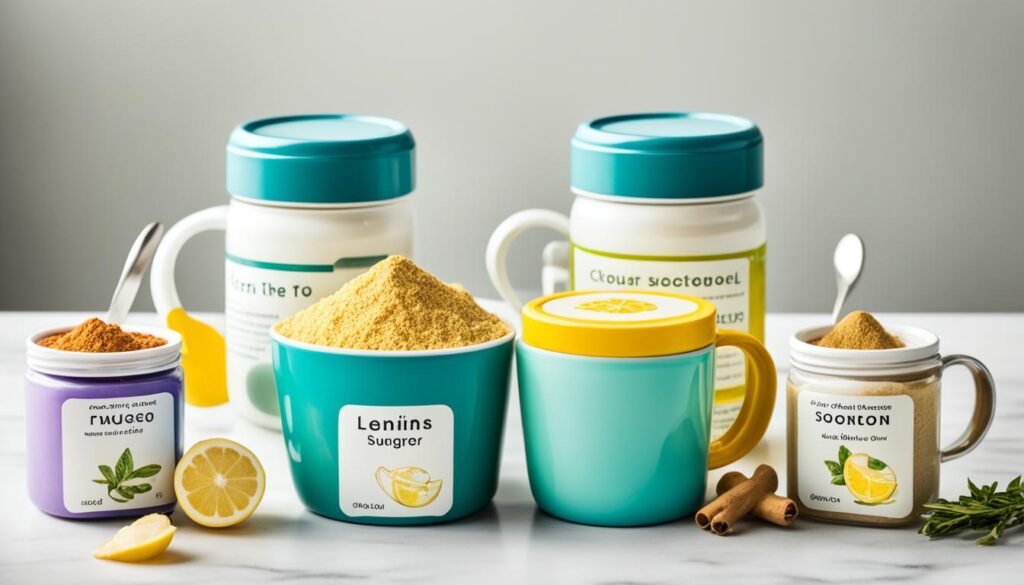
While these hiccup remedies work well, it’s smart to see a healthcare professional if hiccups don’t stop or if you have health issues. With some trying, you can find the best home remedy to get rid of hiccups and feel better.
Sip Water Slowly and Steadily
One of the easiest ways to stop hiccups is by drinking water slowly. This method can break the hiccup cycle. Drinking enough water is crucial to stop hiccups.
Hydration as a Key to Relief
Hiccups happen when the diaphragm gets irritated. Drinking water slowly can soothe this muscle. It stops the muscle from contracting uncontrollably.
To make this hiccup remedy work best, take small sips of water. Swallow each sip slowly. Don’t drink too much water at once, as it might make things worse. Slow, steady drinking is the way to beat get rid of hiccups.
“Proper hydration is essential for stopping hiccups. Sipping water slowly and steadily can help calm the diaphragm and interrupt the hiccup reflex.”
Drinking enough water also helps stop hiccups by fixing any underlying issues. Dehydration can lead to hiccups. So, drinking water regularly can help prevent them.
While drinking water slowly is a basic hiccup remedy, it might not work for everyone. If hiccups don’t go away, try other home remedies for hiccups mentioned in this article.
Take Deep Breaths and Exhale Slowly
Controlling your breathing can help you stop hiccups. Take deep breaths and exhale slowly to relax your diaphragm. This stops the hiccup reflex. Doctors often suggest this easy home remedy.
Here’s how to do it:
- Sit or stand in a comfortable position.
- Inhale deeply through your nose, feeling your belly expand as you draw in a full breath.
- Hold your breath for a few seconds, then slowly exhale through your mouth, letting your belly deflate.
- Repeat this cycle of deep breathing and slow exhalation several times, until you feel the hiccups subside.
Focus on the rhythm of your breathing. Take your time with each inhale and exhale. This simple technique calms the diaphragm and stops the hiccups.
“Controlled breathing exercises can be a powerful tool for stopping hiccups and restoring your body’s natural balance.”
Everyone’s body is different. You might need to try different breathing exercises to see what works best for you. With practice, this simple remedy can help you stop hiccups easily.
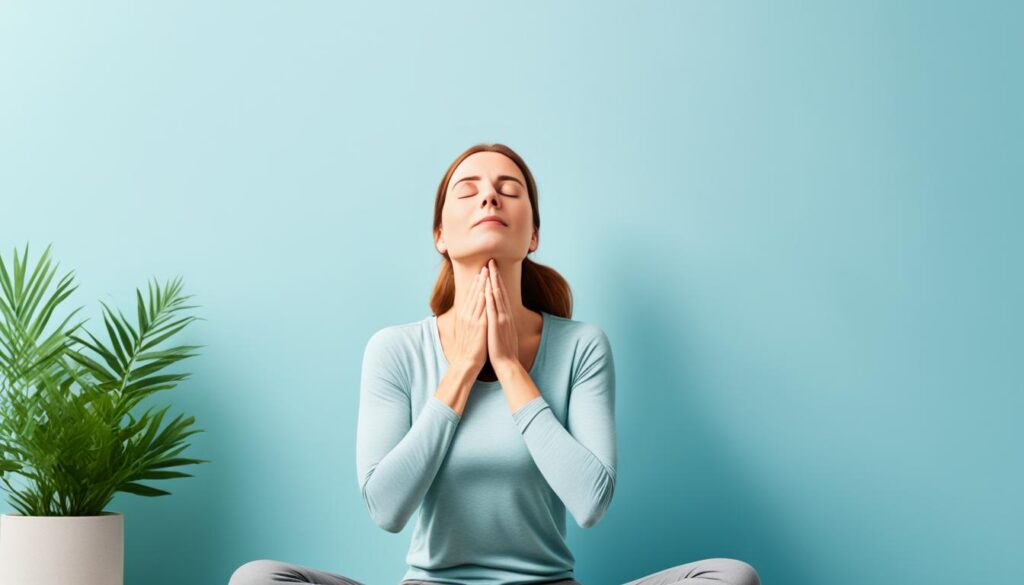
Lean Forward and Apply Gentle Pressure
If you’re having trouble with hiccups, trying a simple body position might help. This method can stop the hiccup reflex and ease your discomfort quickly.
Leveraging Body Positioning
Start by leaning forward a bit while sitting or standing. Put one hand on your chest, right above your breastbone, and the other on your belly. Press gently, but don’t press too hard.
Breathe deeply and slowly, feeling your chest and belly as you exhale. Keep this up for a minute or until the hiccups stop. This gentle pressure and change in breathing can break the hiccup cycle, offering a natural way to get rid of hiccups.
- Lean forward slightly from a seated or standing position
- Gently place one hand on your chest and the other on your abdomen
- Apply light pressure, but avoid pressing too hard
- Breathe deeply and slowly, focusing on your chest and abdomen
- Maintain this posture for a minute or two, or until the hiccups stop
Keep in mind, everyone’s body is different. So, how well this works can vary. If other hiccup remedies haven’t helped, try this simple body position. It might be just what you need to stop hiccups and feel better.

Suck on a Lemon or Consume Sour Flavors
Home remedies for hiccups often include the power of sour flavors. Sucking on a fresh lemon or eating other sour foods and drinks can stop hiccups fast. It’s a simple yet effective way to help.
The science behind this remedy is quite interesting. The sour taste of lemons or other foods can trigger a reaction in the body. This reaction affects the vagus nerve, which controls the diaphragm muscle. This sudden action can stop the hiccup pattern, letting your breathing return to normal.
The Power of Puckering
Other sour foods can also help with hiccups:
- Sucking on a lime wedge
- Drinking a small amount of vinegar or pickle juice
- Chewing on a piece of sour candy
- Consuming a spoonful of mustard
The key is to really enjoy the sour taste. This helps activate the vagus nerve and stop the hiccup reflex. Drinking water slowly while sucking on a lemon wedge works well too.
| Sour Remedy | Effectiveness for Hiccups |
|---|---|
| Lemon | High |
| Lime | Moderate |
| Vinegar | High |
| Pickle Juice | Moderate |
| Sour Candy | Low |
| Mustard | Moderate |
So, if you have hiccups, try a lemon or another sour snack. With a bit of effort, you can get rid of hiccups and feel better.
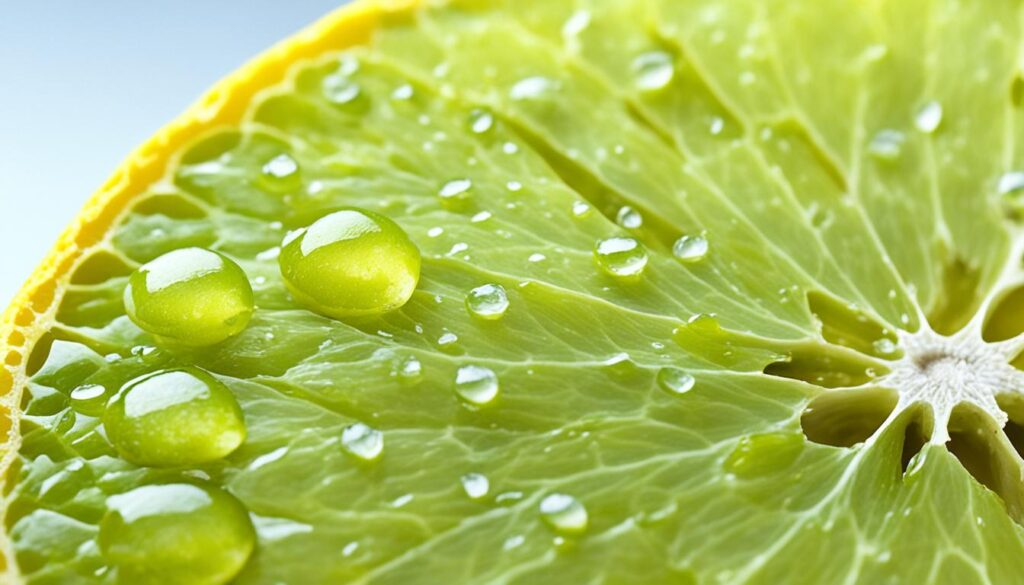
Distract Yourself with Mental Exercises
Getting rid of hiccups can be easy with a bit of mental distraction. Shifting your focus away from the hiccup reflex can break the cycle and bring relief. Here are some simple mental exercises to try at home:
- Count backward from 100 by 3s. This rhythmic task can help take your mind off the hiccups.
- Recite the alphabet backward. Challenging your brain to recall the letters in reverse order creates a mental diversion.
- Visualize a peaceful, calming scene. Imagine yourself in a serene location, like a beach or a forest, and focus on the details.
- Play a word game, such as thinking of items in a specific category or finding words that start with a particular letter.
The key is to find an activity that engages your mind and diverts your attention from the physical sensation of the hiccups. Experiment with different mental exercises to see what works best for you when you need to stop hiccups quickly.
“Distraction is the best medicine for hiccups. When your mind is focused on something else, the hiccup reflex often subsides.”
While mental exercises can be effective hiccup remedies, persistent or recurring hiccups may require medical attention. If your hiccups last for more than a few days or interfere with your ability to eat, drink, or sleep, it’s wise to consult a healthcare professional.

get rid of hiccups, hiccup remedies, stop hiccups, home remedies
Dealing with hiccups can be annoying, but there are ways to stop them. We’ve looked at many strategies to help you, from drinking water to mental exercises. Here are the main points to help you say goodbye to hiccups.
Drinking water slowly is a common way to stop hiccups. Taking deep breaths and exhaling slowly can also calm your breathing and stop hiccups. Pressing gently on your chest or upper belly can help too, by affecting the vagus nerve.
If you want something different, try sucking on a lemon or eating something sour. This can make you salivate and stop the hiccups. Or, you can distract yourself with mental tasks like counting or reciting the alphabet.
While these home remedies often work, see a doctor if your hiccups don’t go away. They could be a sign of something serious.
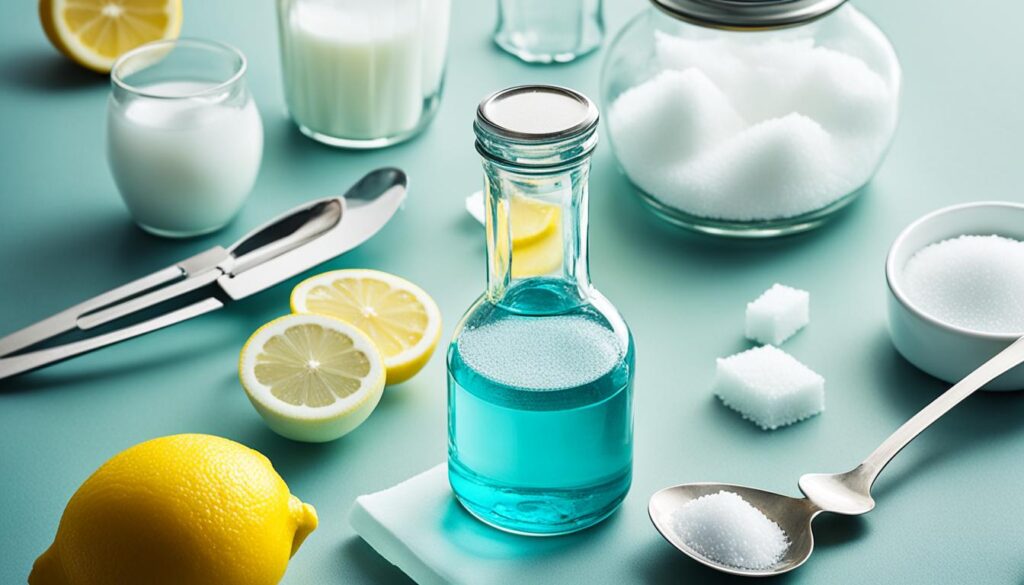
Using these methods can help you beat hiccups and have a better day. So, if you get hiccups, try one of these simple remedies next time.
Acupressure and Massage Techniques
If traditional home remedies don’t work for hiccups, it’s time to try something new. Acupressure and massage can help get rid of hiccups. They offer a natural way to stop hiccups.
Acupressure for Hiccup Remedies
Acupressure uses pressure on certain body points to help energy flow and heal. For hiccup remedies, it focuses on the diaphragm area. This is where hiccups start. By pressing these points, acupressure can stop hiccups and give relief.
- Find the “hegu” point between the thumb and index finger. Press it with your thumb for 1-2 minutes.
- Press the “zhongwan” point below the breastbone. Massage it gently for a few minutes.
- Stimulate the “chize” point on the inner forearm, near the elbow. Use your thumb or index finger for pressure.
Massage Techniques for Home Remedies for Hiccups
Massage is another way to get rid of hiccups. It targets the diaphragm and muscles around it. This helps stop the hiccups.
- Massage the area below the breastbone with circular motions from your fingertips.
- Use light pressure on the neck sides, near the skull base. This helps release neck and upper back tension.
- Try “diaphragmatic breathing” with one hand on your belly and the other on your chest. Breathe deeply, letting your belly move with each breath.
If hiccups don’t go away, see a healthcare professional. Mixing traditional and alternative remedies can help you stop hiccups. Find what works best for you.
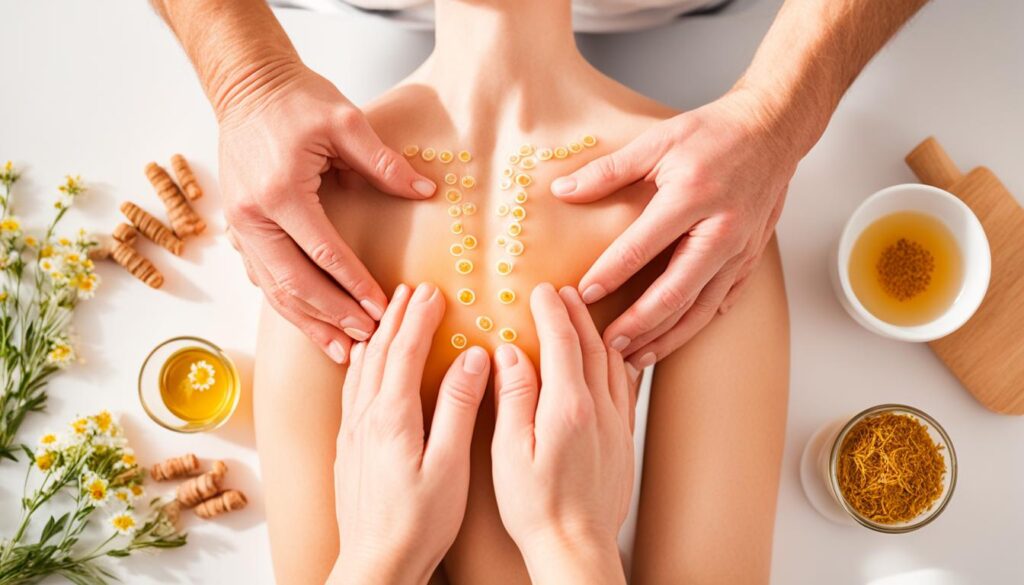
Over-the-Counter Medications and Remedies
For persistent or severe hiccups, over-the-counter (OTC) medications and remedies can help. These options are easy to find and don’t need a prescription. They can effectively stop hiccups and provide relief.
When to Seek Medical Attention
OTC remedies are a good first step for hiccups, but some situations call for a doctor’s help. If hiccups last over 48 hours or are painful, it’s time to see a healthcare professional. They can find the cause and treat it.
Some common OTC options for hiccups include:
- Antacids, such as Tums or Rolaids, which can help relieve hiccups caused by acid reflux
- Simethicone, which can help reduce the buildup of gas that can contribute to hiccups
- Peppermint or menthol lozenges, which may have a soothing effect on the throat and diaphragm
- Sipping cold water or sucking on ice chips, which can sometimes interrupt the hiccup reflex
Always follow the package instructions and talk to a healthcare professional if hiccups don’t go away or get worse. Getting medical help can uncover and treat any underlying health issues. This ensures a better and lasting solution.
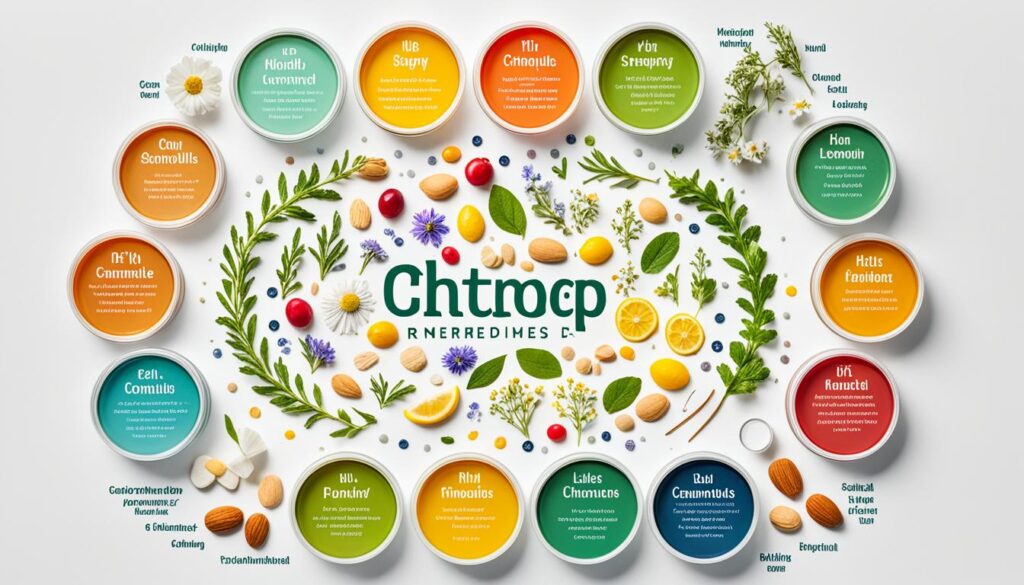
“When home remedies and OTC solutions don’t provide relief, it’s wise to consult a doctor to rule out any underlying medical issues.”
Preventive Measures for Recurrent Hiccups
If you often get hiccups, you can take steps to lessen their frequency. By being proactive, you can control and reduce these annoying hiccups. Simple actions can help you manage them better.
Start by noticing what triggers your hiccups. See if eating too fast or drinking fizzy drinks makes them worse. Try eating more slowly and choose non-fizzy drinks to help.
Living a healthy life also helps prevent hiccups. Make sure you sleep well, manage stress, and stay active. Stress and lack of sleep can make hiccups worse. Taking care of yourself can help keep them away.
Adding some breathing exercises to your day can also help. Deep breaths can calm your diaphragm and stop hiccups. Spend a few minutes each day practicing deep breathing. This could help you feel better over time.
| Preventive Measure | Potential Benefits |
|---|---|
| Identify and avoid triggers | Reduces the likelihood of hiccups occurring |
| Maintain a healthy lifestyle | Supports overall well-being and can help minimize hiccups |
| Incorporate breathing exercises | Helps regulate the diaphragm and reduce hiccup frequency |
Using these steps, you can fight hiccups and enjoy a smoother day. With a bit of care and awareness, you can manage hiccups better. This way, you can live a life free from hiccups.
Managing Stress and Anxiety
Stress and anxiety can really affect our health, including causing hiccups. It’s important to understand how our mind and body are connected. This helps us manage hiccups better and find lasting relief.
The Link Between Stress and Hiccups
When we feel stressed or anxious, our body goes into fight-or-flight mode. This leads to changes in our body, including the diaphragm muscle contracting. This is what often causes hiccups. By dealing with stress and anxiety, we can stop and cure these hiccups.
Strategies for Stress Management
Adding stress-reducing activities to your daily life can greatly improve your health and reduce hiccups. Some good ways to do this include:
- Practicing mindfulness and meditation
- Regular physical exercise
- Getting enough sleep and eating well
- Getting support from friends, family, or a mental health expert when needed
By managing stress and anxiety, you can stop hiccups from happening often and find relief that lasts.
The Power of Positive Coping Mechanisms
Along with managing stress, having positive ways to cope can also help you get rid of hiccups, stop hiccups, and prevent them. Doing things you enjoy, like hobbies or relaxing activities, can be great hiccup remedies and home remedies for hiccups.
By focusing on the mind-body connection and taking a whole approach to health, you can control your hiccups. This leads to a more peaceful and balanced life.
Dietary Considerations and Lifestyle Changes
Getting rid of hiccups can be easier with the right diet and lifestyle. Some foods and habits can make hiccups worse. It’s important to notice how your body reacts to these things.
Drinking enough water is key. Not having enough water can lead to hiccups. Drinking water slowly can also help stop hiccups. But, avoid drinks with carbonation as they can make it worse.
Also, avoid foods that often cause hiccups for you. This includes spicy, greasy, or acidic foods, and alcohol. Knowing what foods trigger hiccups for you can help you avoid them.
Living a healthy life can also help reduce hiccups. Stress and anxiety can cause hiccups. Managing stress with meditation, deep breathing, or exercise can be helpful.
By choosing what you eat wisely and living healthily, you can fight hiccups. Listen to your body and try different things to see what works for you.
| Dietary Factor | Impact on Hiccups |
|---|---|
| Hydration | Dehydration can trigger hiccups, so stay hydrated by drinking water regularly. |
| Spicy, Greasy, or Acidic Foods | These can be common hiccup triggers, so it’s best to avoid them or consume them in moderation. |
| Alcohol | Alcohol can relax the diaphragm and lead to hiccups, so it’s best to limit or avoid consumption. |
| Stress and Anxiety | Managing stress and anxiety through relaxation techniques can help prevent hiccups. |
By choosing wisely what you eat and living healthily, you can fight hiccups. Remember, listen to your body and try different things to see what works for you.
Conclusion
Getting rid of hiccups doesn’t have to be hard. By understanding what causes them and trying different home remedies, you can stop them fast. This guide has shown you many ways to find relief from hiccups.
Simple actions like drinking water slowly or taking deep breaths can help a lot. We also talked about acupressure and massage for more natural ways to stop hiccups.
To effectively get rid of hiccups, hiccup remedies, and stop hiccups, be proactive. Try different home remedies for hiccups until you find what works for you. Staying hydrated, managing stress, and avoiding triggers can also help you control hiccups.
“The secret of getting ahead is getting started.” – Mark Twain
Don’t let hiccups ruin your day anymore. Use the tips from this article to say goodbye to hiccups for good.
Frequently Asked Questions (FAQ)
In this final section, I’ll answer some common questions about hiccups and remedies. This will help readers manage their hiccup issues better.
Many ask, “What causes hiccups, and how can I prevent them?” Hiccups happen when the diaphragm muscle contracts suddenly. This can be from eating too fast, drinking carbonated drinks, or feeling stressed. To avoid hiccups, eat slowly, drink water carefully, and keep stress in check.
People often ask, “What home remedies can stop hiccups?” Drinking water slowly and sucking on a lemon are good options. Trying deep breathing, chest pressure, and mental tasks can also help. Find what works best for you to stop hiccups.
Some wonder, “When should I see a doctor about hiccups?” Hiccups usually go away on their own and are harmless. But if they last over 48 hours or with other health issues, see a doctor. They can help find the cause and treat it.



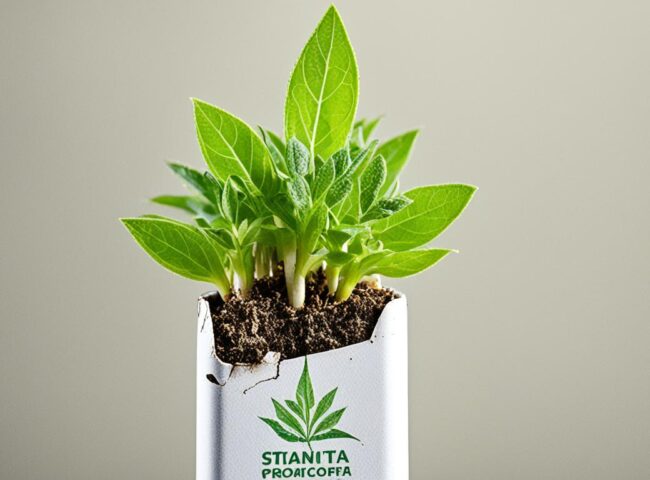
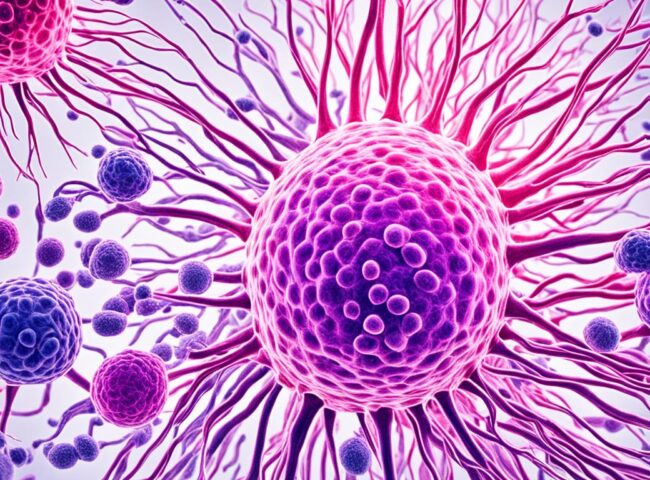


Leave feedback about this